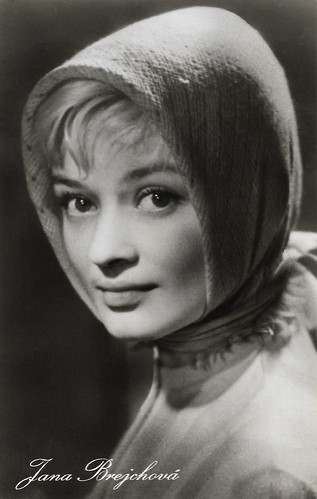
East German postcard by VEB Progress Film-Vertrieb, no. 1011, 1959. Photo: publicity still for Touha / Desire (Vojtech Jasný, 1958).
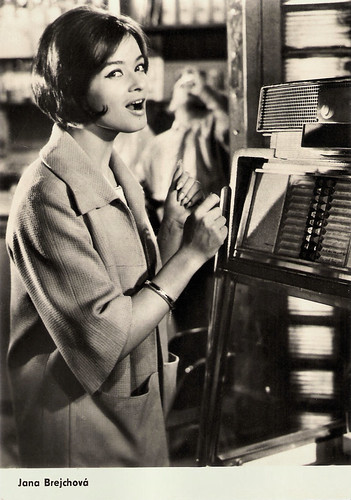
East German postcard by VEB Progress Film-Vertrieb, no. 1565, 1961. Photo: DEFA / Pathenheimer. Publicity still for Der Traum des Hauptmann Loy / The Dream of Captain Loy (Kurt Maetzig, 1961).
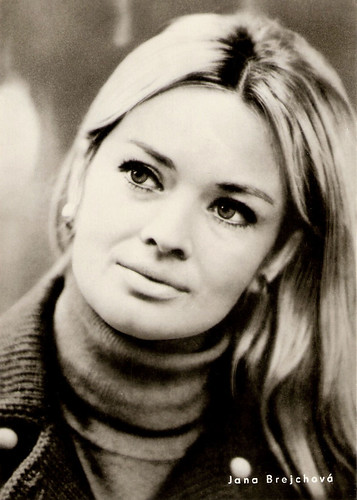
East German postcard by VEB Progress Film-Vertrieb, no. 27/71.
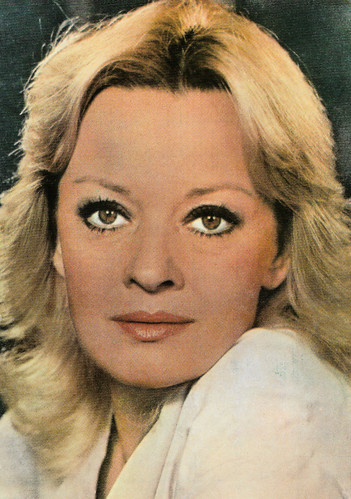
Romanian postcard by Casa Filmului Acin, no. 43078.
Jana and Hana
Jana Brejchová was born in 1940 in Prague, Protectorate Bohemia and Moravia (now the Czech Republic). Her younger sister Hana Brejchová (1946) also became an actress who appeared in the Miloš Forman films Lásky jedné plavovlásky / Loves of a Blonde (1965) and Amadeus (1984).
Jana made her film debut at the age of 13 in Olověný chléb / Lead bread (Jirí Sequens, 1953). One of Jana’s next films was Žižkovská romance / A Local Romance (Zbyněk Brynych, 1958) with Hanus Bor. It was entered into the 1958 Cannes Film Festival. Her next film, Touha / Desire (Vojtěch Jasný, 1958), was also entered into the 1959 Cannes Film Festival.
Another success was Vlcí jáma / Wolf Trap (Jiri Weiss, 1958). The film established director Jiri Weiss as one of the major figures of Czechoslovakia's emerging film industry in the post-war era. It won Weiss the FIPRESCI award at the Venice Film Festival, and the film itself was nominated for the Golden Bear at the Berlin Film Festival.
She played a student in the Czech drama Vyšší princip / Higher Principle (Jirí Krejcík, 1960) based on a short story from the book 'Silent Barricade' by Jan Drda. The story, taking place during the Nazi occupation, is about the relationship between students and their elderly teacher of Latin (František Smolík), nicknamed 'Higher Principle' for his frequent quotation of Seneca's moral precepts.
After three of their classmates are killed by Nazis during the murderous hysteria following the assassination of General Heydrich (just because they made fun of Heydrich), the teacher risks his own life but gains the respect of all students, declaring that from the standpoint of higher principles, the killing of a tyrant is not a crime! The film was temporarily banned in West Germany as being an ‘anti-German film’. Also interesting was Jirí Krejcík’s earlier film Morálka paní Dulské / The Morals of Mrs. Dulski (1958).
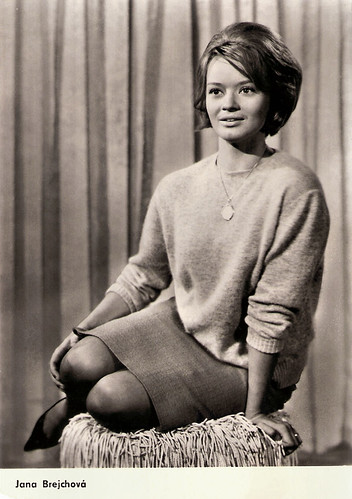
East German postcard by VEB Progress Film-Vertrieb, no. 1409, 1961. Photo: Kurt Wunsch.
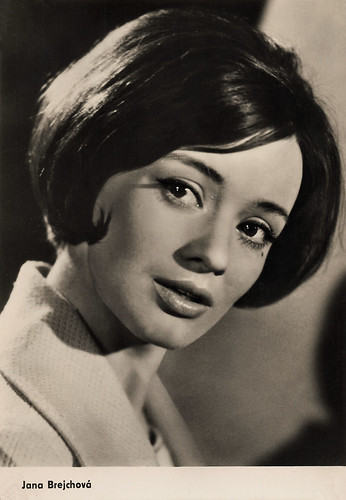
East German postcard by VEB Progress Film-Vertrieb, no. 1573/1961. Photo: DEFA / Pathenheimer. Publicity still for Der Traum des Hauptmann Loy / The Dream of Captain Loy (Kurt Maetzig, 1961).

East German postcard by VEB Progress Film-Vertrieb, Berlin, no. 1740, 1962. Photo: Kurt Wunsch.

East German postcard by VEB Progress Film-Vertrieb, Berlin, no. 1741, 1962. Photo: Kurt Wunsch.
An atomic bomb blast that causes women to grow beards
Jana Brejchová played Princess Bianca in the Czechoslovak romantic adventure film Baron Prášil / The Fabulous Baron Munchausen (Karel Zeman, 1961), based on the tales about the outrageous Baron Munchausen (Miloš Kopecký). The film combines live-action with various forms of animation and is highly stylised, often evoking the engravings of Gustave Doré.
In East Germany, she played in the thriller Der Traum des Hauptmann Loy / The Dream of Captain Loy (Kurt Maetzig, 1961) with Horst Drinda and Ulrich Thein. The latter would become her second husband.
In West Germany, she starred in the romantic comedy Schloß Gripsholm / The Gripsholm Castle (Kurt Hoffmann, 1963) with Walter Giller, and also appeared in Hoffmann’s drama Das Haus in der Karpfengasse / The House in Karp Lane (Kurt Hoffmann, 1965), which was filmed in Prague. The following year, she played again opposite Walter Giller in Dýmky / The Pipes (Vojtěch Jasný, 1966). The film, also starring Gitte Haenning, was entered into the 1966 Cannes Film Festival.
Jana Brejchová starred in Noc nevesty / The Nun's Night (Karel Kachyna, 1967) as a former nun who starts to run her father’s farm. Then followed the comedy Farářův konec / End of a Priest (Evald Schorm, 1969) with her then-husband, Vlastimil Brodský. With Brodsky, she also co-starred in the Czechoslovak musical Noc na Karlštejně / A Night at Karlstein (Zdeněk Podskalský, 1974), based on an 1884 play by Jaroslav Vrchlický.
Oldrich Lipsky directed her in the Science-Fiction comedy Zabil jsem Einsteina, panove / I Killed Einstein, Gentlemen (1970) about an atomic bomb blast that causes women to grow beards and lose the ability to have children. The decision is made to travel back in time and to murder Albert Einstein so that the atomic bomb never gets invented.

Big Czechoslovakian postcard by Nakladatelstvi Orbis, Praha (Prague), no. F 14-10134. Photo: M. Pešan.
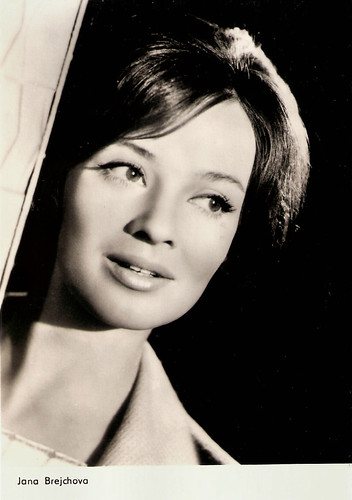
East German postcard by VEB Progress Film-Vertrieb, no. 2294, 1965. Photo: DEFA / Pathenheimer.

Czech postcard by Pressfoto, Praha (Prague). Photo: publicity still for Kdyby tisic klarinetu / If a Thousand Clarinets (Ján Rohác, Vladimír Svitácek, 1965). Collection: Carla Bosch. Carla: Kdyby tisic klarinetu / If a Thousand Clarinets (Ján Rohác, Vladimír Svitácek, 1965) is a fantasy musical film about a mysterious statue of the composer Johann Sebastian Bach that changes guns into musical instruments. The news spreads and a television station decides to make a documentary film about the subject.

Czech postcard by Pressfoto, Praha (Prague), no. A09*51007. Photo: M. Mirvald. Karel Gott, Hana Hegerova, Pavel Sedláček, Jana Brejchova and Waldemar Matuska in Kdyby tisic klarinetu / If a Thousand Clarinets (Ján Rohác, Vladimír Svitácek, 1965). Collection: Carla Bosch.
The Czech Oscar
Since the 1970s, Jana Brejchová also worked as a theatre actress.
Her later films include the Gothic fairytale Panna a netvor / Beauty and the Beast (Juraj Herz, 1978), Mladý muž a bílá velryba / The Young Man and Moby Dick (Jaromil Jireš, 1979), Zánik samoty Berhof / End of the Lonely Farm Berghof (Jiří Svoboda, 1984), the drama Skalpel, prosím / Scalpel, Please (Jiří Svoboda, 1985), and the drama Početí mého mladšího bratra / The Conception of My Younger Brother (Vladimír Drha, 2000) with Dana Vávrová.
Later, she played a supporting part in the tragicomedy Kráska v nesnázích / Beauty in Trouble (Jan Hřebejk, 2006). For her part in this film, she won the Czech Oscar, the Český lev (the Czech Lion).
In 2009, she won another Český lev for her ‘longstanding artistic contribution to Czech film’.
Jana Brejchová was married four times. Her husbands were director Milos Forman (1958-1962), East German actor Ulrich Thein (1964-1965), actor Vlastimil Brodský (1966-1983), and actor Jirí Zahajský (1997-2007 – his death). With Vlastimil Brodsky, she had a daughter, Tereza Brodska, who also became a successful actress. Jana Brejchová died of natural causes in Prague in 2026 at the age of 86.
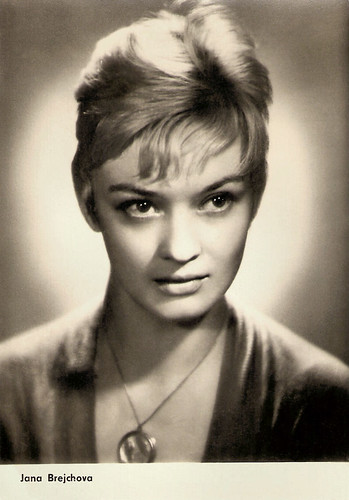
East German postcard by VEB Progress Film-Vertrieb, no. 1.962, 1964. Photo: Ceskolovensky Filmexport, Praha.

Russian postcard, no. M-59698, 1967.
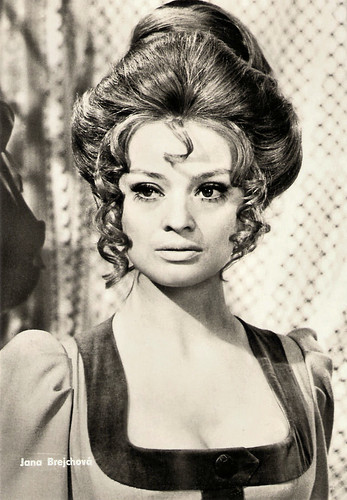
East German postcard by VEB Progress Film-Vertrieb, no. 57/71. Photo: publicity still for Luk královny Dorotky / Queen Dorothy's Bow (Jan Schmidt, 1971).

East German Starfoto postcard by Progress Film-Verleih, Berlin, no. 45/76, 1976. Photo: Linke.
Sources: Wikipedia (Czech and English), and IMDb.
No comments:
Post a Comment